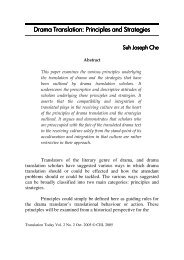Re-Evaluation of Lin Shu (the Chinese Translator) - National ...
Re-Evaluation of Lin Shu (the Chinese Translator) - National ...
Re-Evaluation of Lin Shu (the Chinese Translator) - National ...
Create successful ePaper yourself
Turn your PDF publications into a flip-book with our unique Google optimized e-Paper software.
Xu Jianzhong 161At <strong>the</strong> turn <strong>of</strong> <strong>the</strong> twentieth century, <strong>the</strong>ories <strong>of</strong> evolutionwere to <strong>the</strong> fore in China. <strong>Chinese</strong> literature was also challenged byevolutionism. Liang Qichao first espoused literary evolutionism. Heput “old literature” at <strong>the</strong> opposite position <strong>of</strong> “new literature”. Theidea in literary evolutionism was to root out “old literature”. Theadvocating <strong>of</strong> “New Fiction” was only part <strong>of</strong> <strong>the</strong> literary evolution.He also held <strong>the</strong> idea that literature should be an efficient instrumentto propagate new thoughts and to transform <strong>the</strong> old world (ibid:117). Until <strong>the</strong>n, <strong>the</strong> “Way” conveyed in <strong>Chinese</strong> literature referrednot only to Confucian ideas, but also to ideas <strong>of</strong> national salvationand democracy.<strong>Lin</strong> <strong>Shu</strong>’s translation followed <strong>the</strong> principle that literaturemust be a vehicle <strong>of</strong> <strong>the</strong> “Way”. He understood “Way” as nationalsalvation and feudal ethics as well. A case in point is <strong>the</strong> <strong>Chinese</strong>version <strong>of</strong> Uncle Tom’s Cabin. First he treated <strong>the</strong> novel as apolitical novel to rouse <strong>the</strong> <strong>Chinese</strong> populace to save <strong>the</strong> country. At<strong>the</strong> same time, he also educated his readers with traditional <strong>Chinese</strong>ethics. In order to propagate traditional <strong>Chinese</strong> morality <strong>of</strong> repayinga debt <strong>of</strong> gratitude and to cater to <strong>the</strong> taste <strong>of</strong> <strong>Chinese</strong> readers whowere not familiar with doctrines <strong>of</strong> Christianity, <strong>Lin</strong> <strong>Shu</strong> distorted<strong>the</strong> original.1.2 B. Literary Form Prevalent in Early Modern ChinaAt <strong>the</strong> end <strong>of</strong> <strong>the</strong> nineteenth century, capitalist reformistslaunched “Literary <strong>Re</strong>form Campaign”. “<strong>Re</strong>volution <strong>of</strong> Fiction” wasone part <strong>of</strong> it. From <strong>the</strong>n on, fiction challenged <strong>the</strong> central position<strong>of</strong> poetry in <strong>Chinese</strong> literary system and began to have <strong>the</strong> lion’sshare in <strong>Chinese</strong> literature. The number <strong>of</strong> readers <strong>of</strong> fiction wasmuch more than that <strong>of</strong> o<strong>the</strong>r literary forms. This can partly explainwhy <strong>Lin</strong> <strong>Shu</strong> transformed Western dramas into fictions. Hu Shi(1891-1962) thought <strong>of</strong> <strong>Lin</strong> <strong>Shu</strong> as “<strong>the</strong> worst <strong>of</strong>fender toShakespeare” because he translated dramas by Shakespeare int<strong>of</strong>ictions. During that period, fiction served as a tool <strong>of</strong> wakening
















